
Setup and test results …
Let us now turn to the benchmark results. The test results for SATA3 drives are compared with an ASRock 890GX Extreme3 motherboard and the test results for M.2 modules are performed with an ASRock Z270 Taichi motherboard. The operating system currently used is Microsoft Windows 7 Ultimate Edition and Microsoft Windows 10 Enterprise Edition 64-bit.
With the following SSD benchmark software the drive was checked and compared for the maximum performance:
AS SSD Benchmark – Download
ATTO Disk Benchmark – Download
CrystalDiskMark – Download
HD Tach – Download
SiSoftware Sandra – Download
The AS SSD benchmark values provide a very good indication of the maximum possible read and write speed, the speed for smaller files and their respective access time. By the way, 4K means that small 4K blocks are read or written and with 4K 64Thrd this is distributed to 64 threads at the same time. For example, the benchmark program simulates a typical program start.
With the 2000GB Crucial M.2 P5 drive an extremely high sequential read and write speed could be achieved, which is of course well above conventional SATA SSDs and even well above the Crucial P1 SSD and the Crucial P2 SSD.
The usable capacity of the Crucial P5 M.2 by the way is 1863.01 GB. The Crucial P5 2TB M.2 NVMe achieves 1400 points under Windows 7 and, outside of our SSD comparison tests in Windows 10, respectable 5502 points due to the significantly higher 4K 64Thrd rates!
Here is a screenshot of the AS SSD benchmark rates (Crucial P5 2TB M.2 NVMe Intel Windows 10 test system):
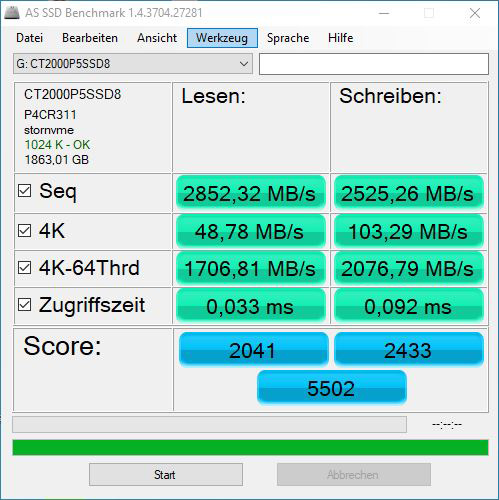
Here is a screenshot of the AS SSD benchmark rates (Crucial P5 2TB M.2 NVMe Intel test system):
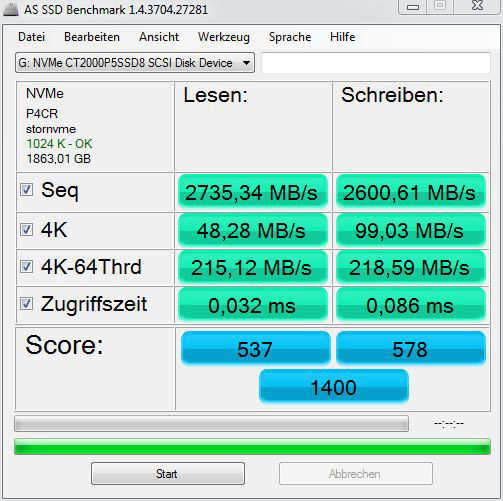
And here is another screenshot of the AS SSD iops results (Crucial P5 2TB M.2 NVMe Intel test system):
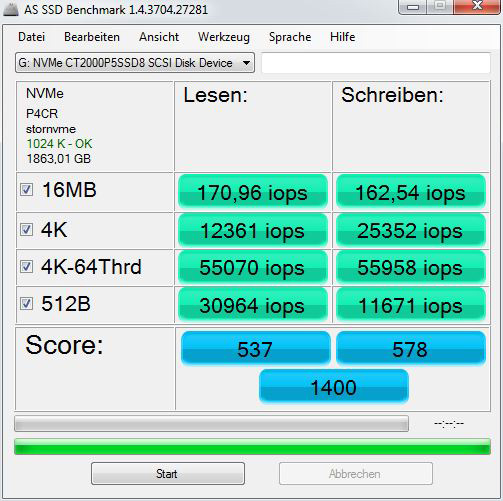
Here is a screenshot of the AS SSD copy benchmark rates (Crucial P5 2TB M.2 NVMe Intel test system):
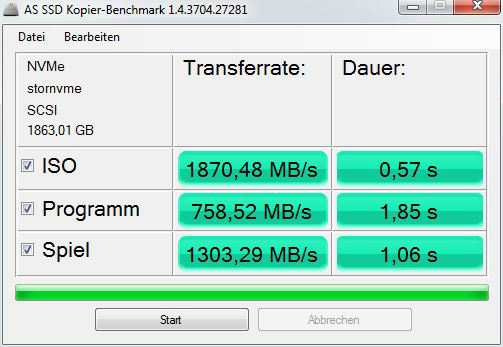
The comparison of the AS SSD benchmark results is extended with every new HDD/SSD test. You can already see some SSDs compared to the Crucial P5 2TB M.2 NVMe SSD, whereby the graphics are regularly updated with new SSD drives. At the time of testing, the top of the AS SSD total score in Windows 7 Ultimate is led by the Samsung 960 Pro 1TB M.2 NMVe SSD, followed by a few more SSDs and then the new P5 M.2 SSD with 2TB capacity.
Here is a comparison of the AS SSD benchmark rates, which are gradually being expanded with new drives:
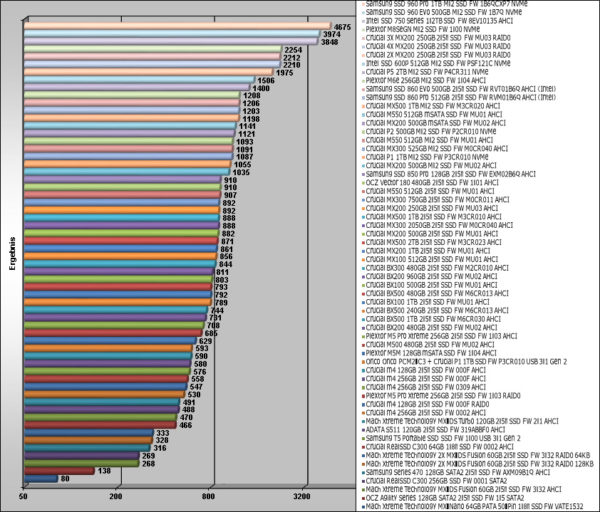
And here is an excerpt of the latest AS SSD benchmark results. For better overview, they will be gradually replaced with latest drives:
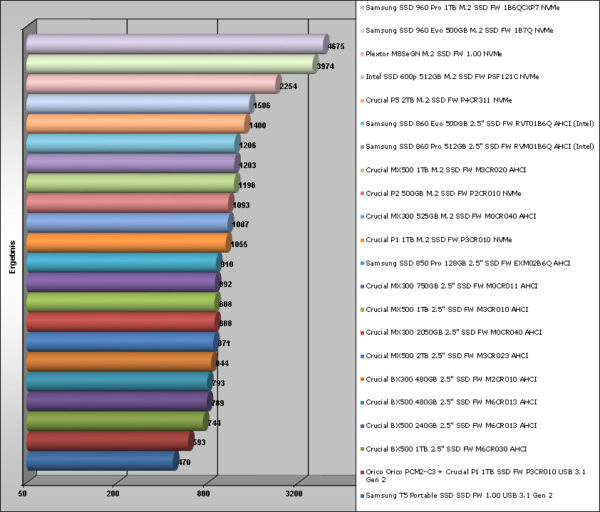
The ATTO disk benchmark results gives a very good overview about the write and read rate on different file sizes. These values are maximum ratings, which are different to the previously continuous transfer rate benchmarks, as this benchmark can be higher even with SSDs with a slower overall performance.
With the Crucial P5 2TB M.2 NVMe SSD, the read speed (green) is already above the write speed (red) from a transfer size of about 0.5KB and reaches the maximum read values of 3429642KB with a transfer size of 4096KB.
Here is a screenshot of the ATTO disk benchmark results (M.2 NVMe):
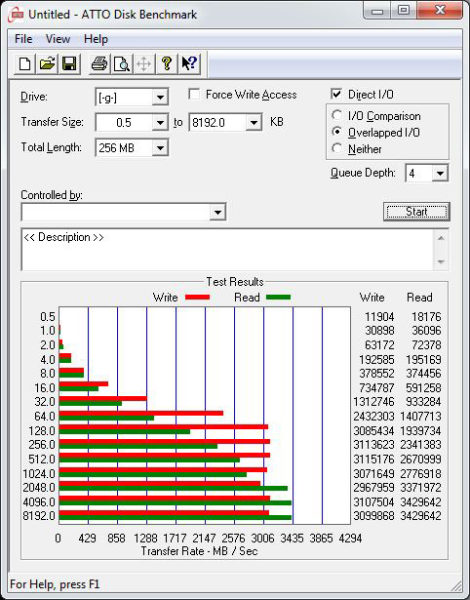
These ATTO disk benchmark results are now compared for a small transfer of 32KB and a large transfer of 8192KB. The bar chart already includes a comparison with some SSDs and hard drives, whereby the Crucial P5 2TB M.2 NVMe SSD takes the lead at ATTO even before the Samsung 960 Pro 1TB M.2 SSD and before the Crucial P2 NVMe SSD.
Here is a comparison of the ATTO disk benchmark results, which will gradually be expanded with more new drives:
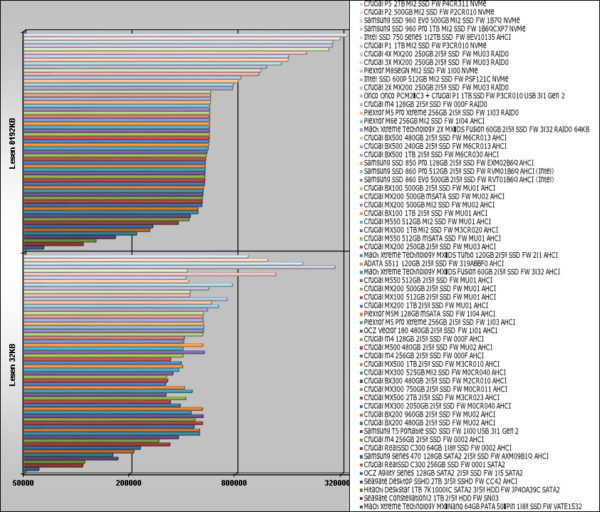
And here is an extract of the latest ATTO disk benchmark results for a better overview, which will be replaced with the latest drives gradually:
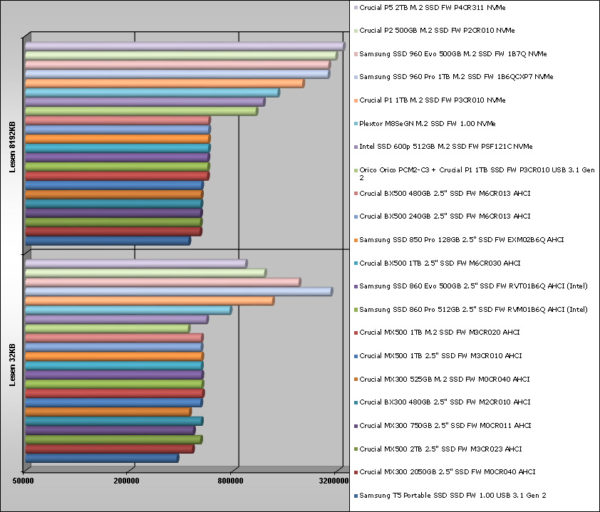
With CrystalDiskMark you also get a balanced measurement of performance with different transfer sizes.
As before, the P5 2TB achieves extremely good sequential read results of 2137 MB/s and even write rates of 2494 MB/s in addition to the 4K-64 threads rates.
Here is a screenshot of the CrystalDiskMark results (M.2 NVMe):
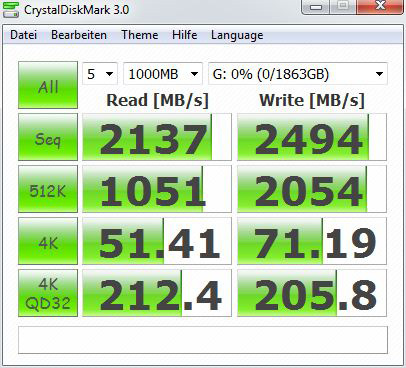
The following diagram shows the CrystalDiskMark results in comparison to the other SSDs and hard drives, which are being expanded step by step. The CrystalDiskMark comparison clearly shows the differences between the solid state drives and hard drives tested so far.
Here is a comparison of the CrystalDiskMark values, which will be gradually expanded with more new drives:
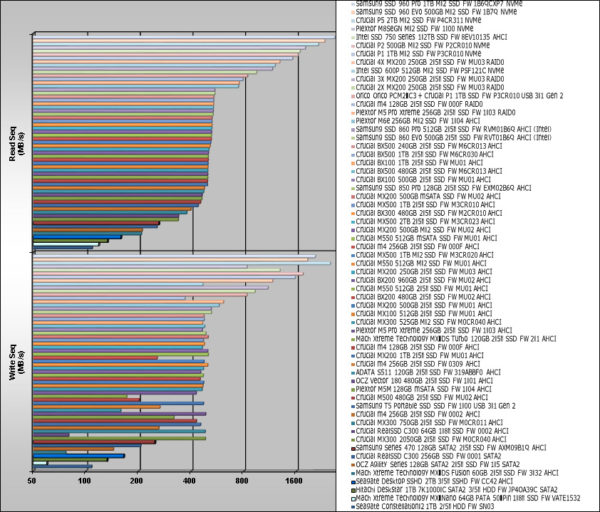
And here is an extract of the latest CrystalDiskMark ratings for a better overview, which will gradually be replaced with the latest drives:
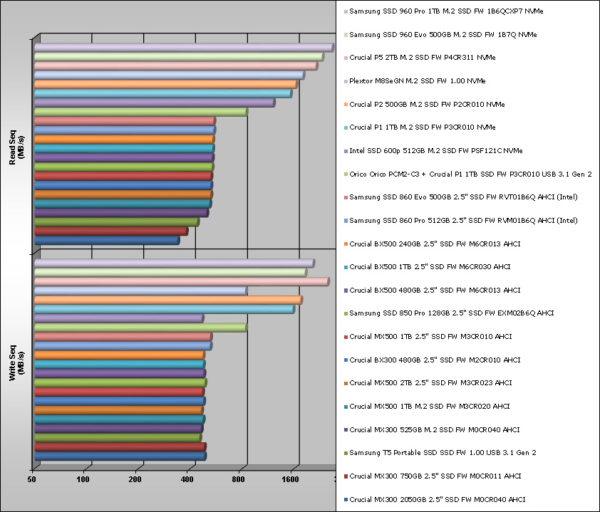
The HD Tach benchmark rates show the course of the performance very nicely, but it’s clearly different in an SSD than in a conventional HDD. Due to the new logical management of the SSD controllers when accessing the NAND cells, the results with the HD Tach version 3.0.4.0, which is designed for hard disks, can fluctuate as with similarly constructed SSDs.
HD Tach of the Crucial P5 2TB M.2 SSD shows clear peaks with the lowest access time of 0.0ms in both read and write operations.
For easy comparison, the values of the previous SSD tests can be selected and viewed via a drop-down field.
Here is a screenshot of the HD Tach benchmark results:
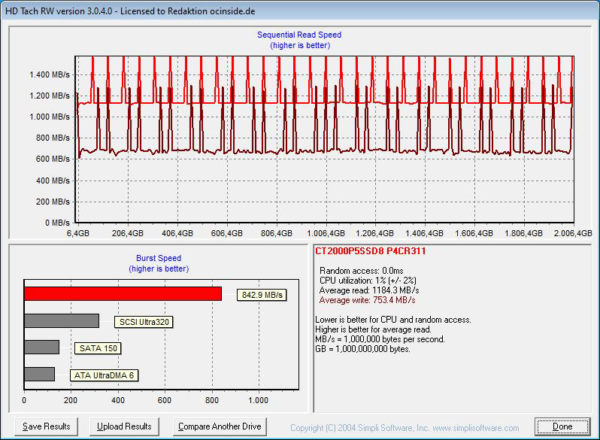
In order to see how the 96 layer 3D TLC NAND Flash performs with the used controller during a larger file transfer, we additionally ran the time-consuming Long Bench. Here you can see a stronger performance drop at longer write rates, which we already know from TLC SSDs. However, we also assume that SSD thermal throttling is already beginning, since we achieved better results with a M.2 heatsink.
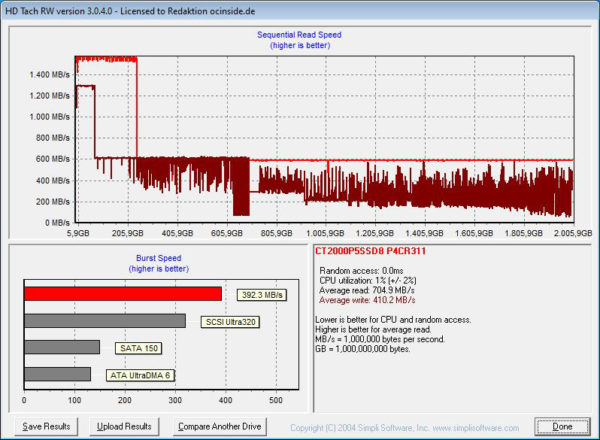
In order to see if this only occurs in demanding benchmarks or also in usual copying processes, we additionally copied a 100GB from the P5 SSD to the P5 SSD, thus simultaneous reading and writing. A continuous file transfer of about 2GB/s was achieved at any time, so that we fortunately didn’t notice any thermal throttling!
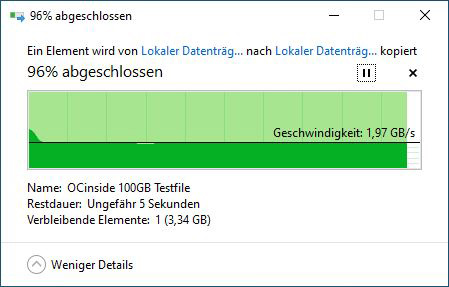
Here is a comparison of the HD Tach benchmark values, which are gradually being expanded with new drives:
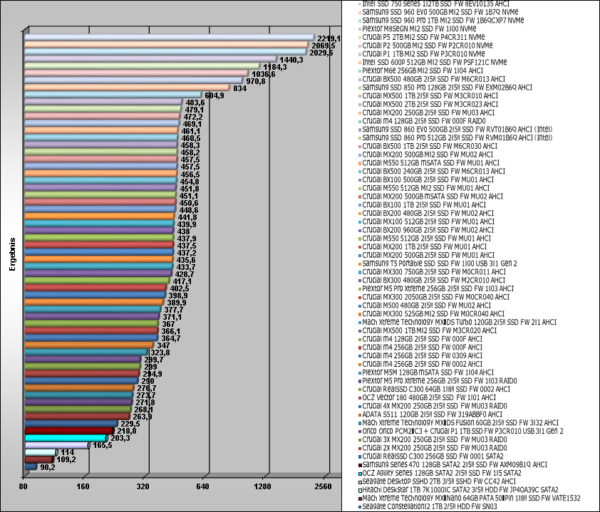
And here is an extract of the latest HD Tach benchmark values for a better overview, which will gradually be replaced with the latest drives:
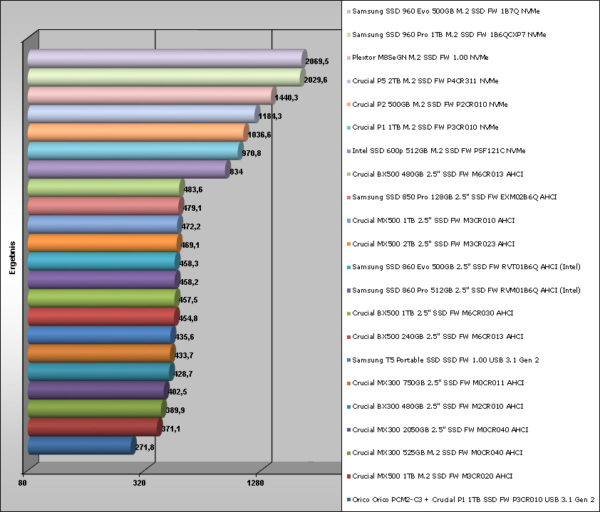
SiSoftware Sandra benchmark results
The SiSoftware Sandra benchmark is of course a must in the test series. With the SiSoft Sandra program, SiSoftware has had a very comprehensive tool on the market for several years, with which very reliable test results can be obtained from all hardware components.
The average access time of the Crucial P5 2TB M.2 NVMe SSD at SiSoftware Sandra was low at 41us and the drive index of 3089.06 MB/s is a great result!
Here is a screenshot of SiSoftware Sandra benchmark read rates (M.2 NVMe):

In the SiSoftware Sandra write performance measurement, the average access time of the Crucial P5 2TB M.2 NVMe SSD was also at extremely low 19us and the drive index reached very high 2830.48 MB/s.
Here is a screenshot of the SiSoftware Sandra benchmark write performance (M.2 NVMe):

Here is a comparison of the SiSoftware Sandra benchmark values, which are gradually being expanded with more new drives:
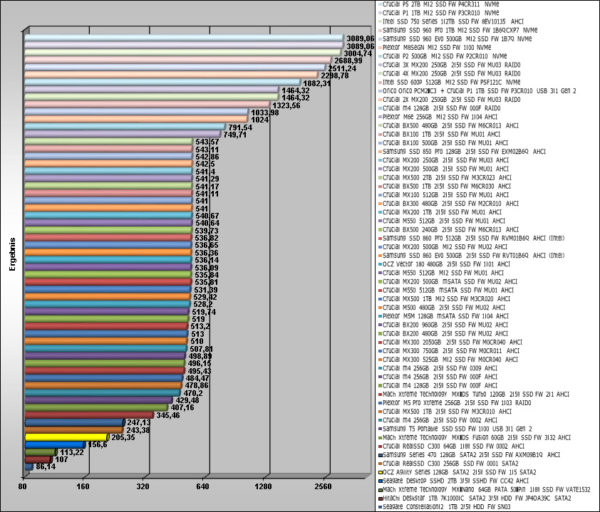
And here is an extract of the latest SiSoftware Sandra benchmark values for a better overview, which will gradually be replaced with the latest drives:
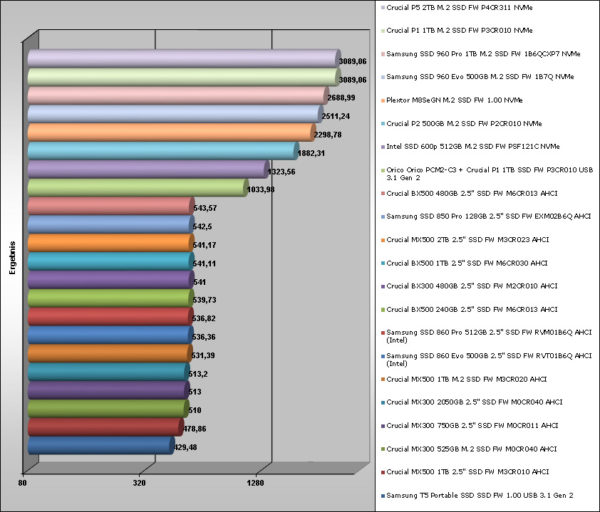
Crucial P5 2TB M.2 NVMe Result and general impression …

